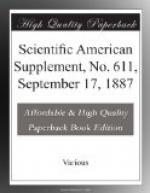When the cereal crops of our country are light, or the prices fall below profitable production, the farmer has always a colt or two to sell, thus helping him through the year. In place of constantly importing horses from France, England, and Scotland, where they are raised mostly in paddocks, and paying out annually millions of dollars, it is our duty to be exporting.
As an American I am ashamed when I see paraded at our county or state fairs stallions and mares wearing the “blue ribbon” of superexcellence, with boastful exclamation by the owner of “a thoroughbred imported Percheron, or a thoroughbred imported French coacher, or a thoroughbred imported Scotch Clyde, or a thoroughbred imported English coacher, or a thoroughbred imported English Shire, or a thoroughbred imported English Cleveland Bay!”
The American farmer and his boys look on aghast at the majesty and beauty of these prize winners over our big-headed, crowbar-necked, limp-tailed, peeked-quartered horses called “standard bred!” What standard? “Time standard,” as created by a man who is neither a horseman nor a breeder; but because of the lack of intelligent information and want of courage upon the part of a few, this man’s ipse dixit has become law for the American breeders until such time as cultured intelligence shall cause them to rebel. It soon will.
It is indeed time for the government to step in and regulate our horse breeding. Of all the national industries there is none of more importance than that of horses. More so in America than in any other country, because our facilities are greater, and results can be greater under proper regulation. Lieut. Robertson has proved to be the right man in the right place, to open the door for glorious results to our nation. No one man or a small body of men can regulate this horse-breeding industry, but as in France, Russia, and England, the government must place its hand and voice.
We are indeed an infant country, but have grown to an age where parental restraint must be used now, if ever. We have millions of farmers in America, breeding annually millions of horses; and except we have another internal war, our horses will soon become a burden and a pest.
There are numbers of rich men throughout the country breeding fancy horses, for sport and speculation, but they only add to the increasing burden of useless animals, except for gambling purposes; for they are neither work horses, coach horses, nor saddle horses. Our farmers of the land are the breeders, as our recent war of the rebellion testified. The war of 1812, the Mexican war of 1847, and the war of 1861 each called for horses at a moment’s notice, and our farmers supplied them, destroying foundation bloods for recuperation. From 1861 to 1863 the noble patriotism of our farmers caused them to vie with each other as to who should give the best and least money to help the government; and cannot our government now do something for the strength and sinew of the land, the farmers?




